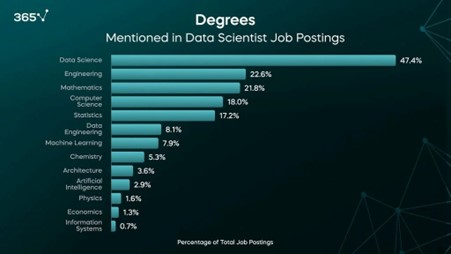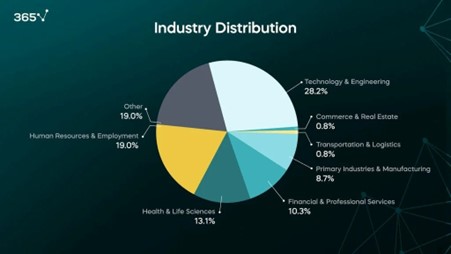Growing Clout of Data Science – Part I

The US Bureau of Labor Statistics forecasts that data scientist roles will remain among the fastest-growing jobs in 2024. Even without much hype or pronounced fanfare, professions built around data science are steadily growing in clout
Peter Sondergaard, former Senior Vice President at Gartner, had once memorably stated, “Information is the oil of the 21st century, and analytics is the combustion engine.”In this age of digital transformation, data – the building blocks of information –is powering global innovation. With all the connected devices and smart tech out there, and the ever-growing Internet of Things, we’re generating data like never before – practically ushering in a data-driven revolution. And with sophisticated data analysis techniques, from machine learning to predictive modelling, we are now able to extract some serious insights from all that information. It’s a total game-changer, reshaping how businesses operate and how we lead our lives. The ability to harness the power of data has become the decisive competitive edge, as organisations across sectors strive to maximise the value ofinformation.
A Data-Driven Future
In the rapidly evolving digital landscape, data science is emerging as a fundamental driving force that is poised to transform every major industry sector. Gone are the days when data analysis was confined to specialised teams and siloed departments. Today, data science is becoming an integral part of strategic decision-making, operational optimisation, and innovative product development in organisations of all sizes and across all verticals. As we peer into the future, it is clear that the influence of data science will only continue to grow, revolutionising the way companies operate, compete, and deliver value to their customers.
Only a few years ago, data science was a niche domain about which the average person was quite oblivious. The scenario has changed now, and the increasing importance of data in all aspects of our everyday transactions has led to a specialised demand for data science professionals across industries. The World Economic Forum’s Future of Jobs 2023 report projects a 40% higher demand for AI/ML professionals by 2027, while a 30–35% growth in demand is projected for data analysts, scientists, engineers, BI analysts, big data and database roles.
Even without much hype or pronounced fanfare, professions built around data science are steadily growing in clout, although skillsets and job profiles in this domain keep transforming. The US Bureau of Labor Statistics forecasts that data scientist roles will remain among the fastest-growing jobs in 2024, with a 35% projected increase in job openings between 2022 and 2032. Most encouraging is the fact that more and more recruiters are looking for core Data Science degrees to fill up these roles.
A Data-Driven Future
In the rapidly evolving digital landscape, data science is emerging as a fundamental driving force that is poised to transform every major industry sector. Gone are the days when data analysis was confined to specialised teams and siloed departments. Today, data science is becoming an integral part of strategic decision-making, operational optimisation, and innovative product development in organisations of all sizes and across all verticals. As we peer into the future, it is clear that the influence of data science will only continue to grow, revolutionising the way companies operate, compete, and deliver value to their customers.
Only a few years ago, data science was a niche domain about which the average person was quite oblivious. The scenario has changed now, and the increasing importance of data in all aspects of our everyday transactions has led to a specialised demand for data science professionals across industries. The World Economic Forum’s Future of Jobs 2023 report projects a 40% higher demand for AI/ML professionals by 2027, while a 30–35% growth in demand is projected for data analysts, scientists, engineers, BI analysts, big data and database roles.
Even without much hype or pronounced fanfare, professions built around data science are steadily growing in clout, although skillsets and job profiles in this domain keep transforming. The US Bureau of Labor Statistics forecasts that data scientist roles will remain among the fastest-growing jobs in 2024, with a 35% projected increase in job openings between 2022 and 2032. Most encouraging is the fact that more and more recruiters are looking for core Data Science degrees to fill up these roles.

Figure 1: Academic requirements sought for Data Science jobs; Source: www.365datascience.com
Redefining Efficiency and Productivity
One of the most tangible ways in which data science is transforming industries is through enhanced operational efficiency and productivity. By applying advanced analytics, machine learning, and predictive modelling to massive datasets, organisations are able to uncover hidden patterns, identify bottlenecks, and make data-driven decisions that drive measurable improvements.
By transforming raw data into actionable insights, organisations across industries are able to operate with greater agility, efficiency, and competitiveness. But the influence of data science extends far beyond optimising existing processes. Perhaps even more significantly, data-driven insights are fuelling groundbreaking innovations that are disrupting established industry norms.
Powering Innovation and Disruption
In manufacturing, for example, data science is enabling smart factories to optimise production workflows, predict equipment failures, and minimise waste and downtime. Retail businesses are leveraging customer data to personalise the shopping experience, optimise inventory and supply chains, and make more accurate sales forecasts. Even in the public sector, data science is being used to enhance resource allocation, improve the delivery of social services, and make cities smarter and more habitable.
In the healthcare sector, for instance, the application of data science to health data, is leading to breakthroughs in personalised medicine. Pharmaceutical companies are leveraging analytical tools to fast-track long-drawn R&D procedures in drug development. Banking and financial services are overhauling risk management, trading pattern analytics, and automation. Even traditional industries like agriculture is getting a total facelift through precision farming and predictive analytics – thus being more resilient to the whims of unpredictable weather.
The common thread across these diverse examples is the ability of data science to challenge existing assumptions, and pave the way for disruptive solutions.

Figure 2: Current industry distribution of Data Science roles; Source: www.365datascience.com
Elevating the Human Experience
One less obvious, but more profound, impact of data science lies in its ability to enhance the human experience. Data-driven insights enables organisations to develop products and services that are more personalised, intuitive, and responsive to the needs and preferences of their customers and employees.
Streaming platforms like Netflix and Spotify use sophisticated recommendation algorithms to suggest content that aligns with each user’s unique tastes and viewing habits. This not only improves customer satisfaction but also drives increased engagement and loyalty.
Similarly, data science is enabling e-commerce businesses to offer seamless, omni-channel shopping experiences that anticipate customer needs and preferences. By analysing browsing behaviour, purchase history, and demographic data, these companies can personalise product recommendations, optimise pricing and promotions, and streamline the checkout process.
Beyond consumer-facing industries, data science is also transforming the employee experience. HR departments are leveraging data analytics to improve talent acquisition, enhance training and development programs, and foster more engaged and productive teams. By identifying patterns in employee performance, sentiment, and attrition, organisations can make data-driven decisions that support the well-being and professional growth of their workforce.
Ultimately, the power of data science lies in its ability to put the human experience at the centre of decision-making. By understanding customers and employees as unique individuals, rather than as homogeneous segments, companies can create more meaningful, personalised, and empowering experiences.Data analysis goes a long way to facilitate such understanding.
—
Look out for Part 2, where we elaborate more upon how various industry sectors are harnessing the power of analytics.
[To be concluded]
Know more about the syllabus and placement record of our Top Ranked Data Science Course in Kolkata, Data Science course in Bangalore, Data Science course in Hyderabad, and Data Science course in Chennai.


